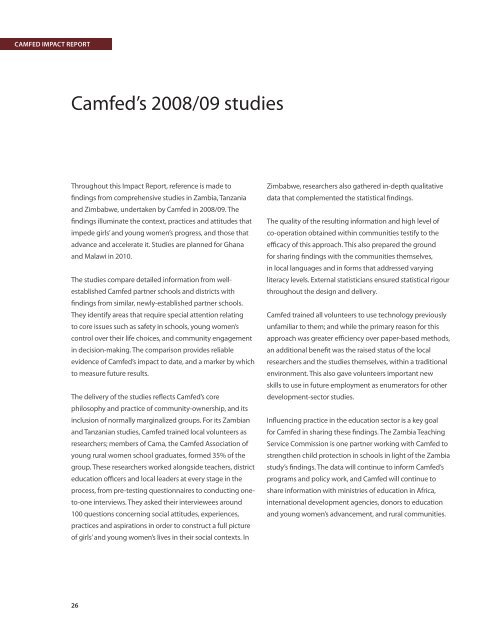Download 2010 Camfed Impact Report PDF - United Nations Girls ...
Download 2010 Camfed Impact Report PDF - United Nations Girls ...
Download 2010 Camfed Impact Report PDF - United Nations Girls ...
Create successful ePaper yourself
Turn your PDF publications into a flip-book with our unique Google optimized e-Paper software.
CAMFED IMPACT REPORT<br />
<strong>Camfed</strong>’s 2008/09 studies<br />
Throughout this <strong>Impact</strong> <strong>Report</strong>, reference is made to<br />
findings from comprehensive studies in Zambia, Tanzania<br />
and Zimbabwe, undertaken by <strong>Camfed</strong> in 2008/09. The<br />
findings illuminate the context, practices and attitudes that<br />
impede girls’ and young women’s progress, and those that<br />
advance and accelerate it. Studies are planned for Ghana<br />
and Malawi in <strong>2010</strong>.<br />
The studies compare detailed information from wellestablished<br />
<strong>Camfed</strong> partner schools and districts with<br />
findings from similar, newly-established partner schools.<br />
They identify areas that require special attention relating<br />
to core issues such as safety in schools, young women’s<br />
control over their life choices, and community engagement<br />
in decision-making. The comparison provides reliable<br />
evidence of <strong>Camfed</strong>’s impact to date, and a marker by which<br />
to measure future results.<br />
The delivery of the studies reflects <strong>Camfed</strong>’s core<br />
philosophy and practice of community-ownership, and its<br />
inclusion of normally marginalized groups. For its Zambian<br />
and Tanzanian studies, <strong>Camfed</strong> trained local volunteers as<br />
researchers; members of Cama, the <strong>Camfed</strong> Association of<br />
young rural women school graduates, formed 35% of the<br />
group. These researchers worked alongside teachers, district<br />
education officers and local leaders at every stage in the<br />
process, from pre-testing questionnaires to conducting oneto-one<br />
interviews. They asked their interviewees around<br />
100 questions concerning social attitudes, experiences,<br />
practices and aspirations in order to construct a full picture<br />
of girls’ and young women’s lives in their social contexts. In<br />
Zimbabwe, researchers also gathered in-depth qualitative<br />
data that complemented the statistical findings.<br />
The quality of the resulting information and high level of<br />
co-operation obtained within communities testify to the<br />
efficacy of this approach. This also prepared the ground<br />
for sharing findings with the communities themselves,<br />
in local languages and in forms that addressed varying<br />
literacy levels. External statisticians ensured statistical rigour<br />
throughout the design and delivery.<br />
<strong>Camfed</strong> trained all volunteers to use technology previously<br />
unfamiliar to them; and while the primary reason for this<br />
approach was greater efficiency over paper-based methods,<br />
an additional benefit was the raised status of the local<br />
researchers and the studies themselves, within a traditional<br />
environment. This also gave volunteers important new<br />
skills to use in future employment as enumerators for other<br />
development-sector studies.<br />
Influencing practice in the education sector is a key goal<br />
for <strong>Camfed</strong> in sharing these findings. The Zambia Teaching<br />
Service Commission is one partner working with <strong>Camfed</strong> to<br />
strengthen child protection in schools in light of the Zambia<br />
study’s findings. The data will continue to inform <strong>Camfed</strong>’s<br />
programs and policy work, and <strong>Camfed</strong> will continue to<br />
share information with ministries of education in Africa,<br />
international development agencies, donors to education<br />
and young women’s advancement, and rural communities.<br />
26
















